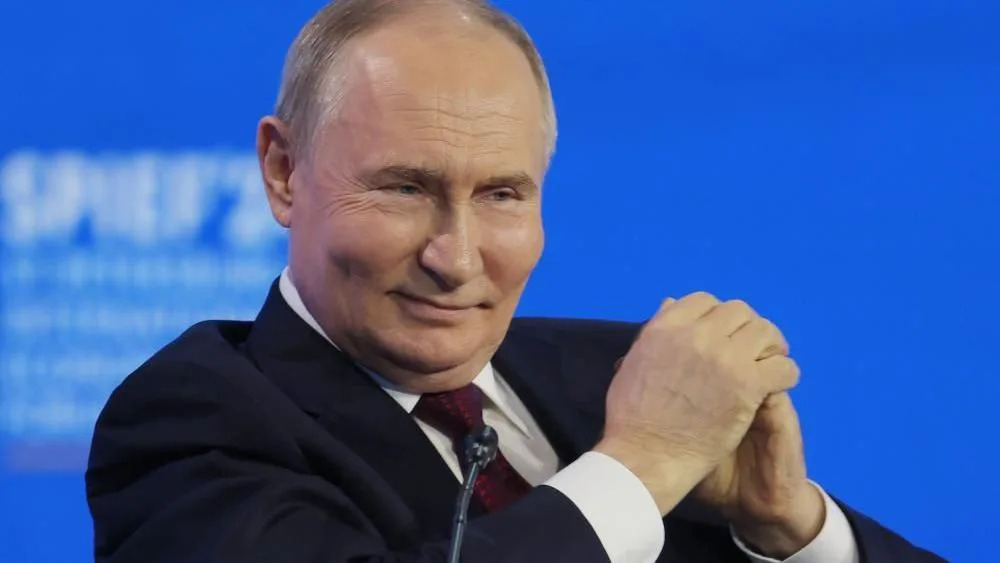The Russian president's speech capped a surreal week in St Petersburg
Ever since Russia’s full-scale invasion of Ukraine, Moscow has been engaged in nuclear sabre-rattling, dropping a series of not-so-subtle hints that trying to defeat a nuclear power like Russia could have disastrous consequences for those who try.
Today President Putin claimed that Russia wouldn’t need to use a nuclear weapon to achieve victory in Ukraine.
He was being interviewed at a panel discussion at the St Petersburg International Economic Forum: the annual event often described as ‘Russia’s Davos’.
There are few occasions when Mr Putin looks dovish compared to the person asking him the questions.
But when the person asking the questions is Sergei Karaganov it would be hard not to. Mr Karaganov is a hawkish Russian foreign policy expert. Last year he called for a pre-emptive nuclear strike. Today he suggested holding a “nuclear pistol” to the temple of the West over Ukraine.
President Putin wasn’t so extreme in his language.
But he is no dove.
The Kremlin leader said he did not rule out changes to Russia’s nuclear doctrine: the document which sets out the conditions under which Russia would use nuclear weapons.
“This doctrine is a living tool and we are carefully watching what is happening in the world around us and do not exclude making changes to this doctrine. This is also related to the testing of nuclear weapons.”
And he delivered a warning to those European countries who’ve been supporting Ukraine: Russia’s has “many more [tactical nuclear weapons] than there are on the European continent, even if the United States brings theirs over.”
“Europe does not have a developed [early warning system],” he added. “In this sense they are more or less defenceless.”
Tactical nuclear weapons are smaller warheads designed to destroy targets without widespread radioactive fallout.
AfriPrime App link: FREE to download...
https://www.amazon.com/Africircle-AfriPrime/dp/B0D2M3F2JT
This has been a surreal week in St Petersburg. On the one hand, a huge international economic forum has been taking place , sending the message that Russia is ready for cooperation and that, despite everything, it’s business as usual.
Clearly, though, it is not business as usual. Russia is waging war in Ukraine, a war which is now in its third year; as a result, Russia is the most heavily sanctioned country in the world.
And, right now, tensions are soaring between Russia and the West.
Earlier this week, at a meeting with international news agency chiefs in St Petersburg, President Putin suggested that Russia might supply advanced conventional long-range weapons to others to strike Western targets.
This was his response to Nato allies allowing Ukraine to strike Russian territory with Western-supplied weapons.
He repeated the idea again today.
“We are not supplying those weapons yet, but we reserve the right to do so to those states or legal entities which are under certain pressure, including military pressure, from the countries that supply weapons to Ukraine and encourage their use on Russian territory.”
There were no details. No names.
So, to which parts of the world might Russia deploy its missiles?
“Wherever we think it is necessary, we’re definitely going to put them. As President Putin made clear, we’ll investigate this question,” Vladimir Solovyov, one of Russian state TV’s most prominent hosts, tells me.
“If you are trying to harm us you have to be pretty sure we have enough opportunities and chances to harm you.”
“In the West some will say we’ve heard this sabre-rattling before,” I respond, “and that it’s a bluff.”
“It’s always a bluff. Until the time when it is not,” Mr Solovyov replies. “You can keep thinking that Russia is bluffing and then, one day, there is no more Great Britain to laugh at. Don’t you ever try to push the Russian bear thinking that ‘Oh, it’s a kitten, we can play with it.”
CEOs from Europe and America used to flock to the St Petersburg International Economic Forum. Not any more. Instead I saw delegations from Asia, Africa, the Middle East and South America. Russia has been using this year’s event to try to show that, despite Western sanctions, there are plenty of countries in the world who are ready to do business with Russia.
And what have we learnt in St Petersburg about Vladimir Putin?
That he sounds increasingly confident and determined not to back down. He seems to believe that in the current standoff between Russia and the West, it is the West that will blink first.
AfriPrime App link: FREE to download...
https://www.amazon.com/Africircle-AfriPrime/dp/B0D2M3F2JT
Putin says Russia does not need to use nuclear weapons for victory in Ukraine
President Vladimir Putin said on Friday Russia had no need to use nuclear weapons to secure victory in Ukraine, the Kremlin's strongest signal to date that Europe's deadliest conflict since World War Two will not escalate into a nuclear war.
Since Putin ordered troops into Ukraine in February 2022, he has said on several occasions that Russia would use such weapons if necessary to defend itself - comments the West says are nuclear sabre-rattling.
Asked at the plenary session of the St Petersburg International Economic Forum by moderator Sergei Karaganov, an influential Russian analyst, if Russia should hold a "nuclear pistol to the temple" of the West over Ukraine, Putin said he did not see the conditions for using such weapons.
"The use is possible in an exceptional case - in the event of a threat to the sovereignty and territorial integrity of the country. I don't think that such a case has come. There is no such need," Putin said.
Moscow considers Crimea - which it seized from Ukraine in 2014 - and four other Ukrainian regions now as integral parts of its own territory, raising the possibility of a nuclear strike if Kyiv appeared poised to retake them.
Ukraine has stepped up drone and missile attacks on Russian targets, including in Crimea, and has vowed to drive all Russian forces from its territory.
Putin said he did not rule out changes to Russia's nuclear doctrine, which sets out the conditions under which such weapons could be used.
He also said that if necessary Russia could test a nuclear weapon, though he saw no need to do so at the present time.
The public debate about nuclear strikes on a stage at Russia's premier economic forum appeared to be a Kremlin attempt to reduce nuclear fears just as the Ukraine war escalates towards what both Russian and U.S. diplomats say is its most dangerous phase yet.
Russia and the United States hold nearly 90% of the world's nuclear weapons.
NUCLEAR WAR?
Last year Karaganov proposed a limited nuclear strike on a NATO member in Europe to force the West to back off in the conflict over Ukraine and thus avert World War Three.
On Friday Karaganov invoked the Biblical story of how God destroyed the cities of Sodom and Gomorrah for their wickedness as he pressed Putin on whether Russia should escalate in Ukraine to teach the West "a lesson".
Putin said he prayed that the world would never witness a nuclear confrontation, adding: "And we don't have that need. Because our armed forces are not just gaining experience, they are increasing their effectiveness."
Russian troops are advancing along the front line in Ukraine, Putin said, adding they had taken 880 square km of territory since the start of the year, including 47 villages and towns.
Putin said Russia had increased ammunition production by more than 20 times and was outproducing Ukraine and the West on a whole series of measures.
Russia's published 2020 nuclear doctrine sets out the conditions under which a Russian president would consider using a nuclear weapon: broadly as a response to an attack using nuclear or other weapons of mass destruction, or to the use of conventional weapons against Russia "when the very existence of the state is put under threat".
"But this doctrine is a living tool and we are carefully watching what is happening in the world around us and do not exclude making some changes to this doctrine. This is also related to the testing of nuclear weapons."
"If necessary, we will conduct tests. So far, there is no need for this either...," he added.
U.S. President Joe Biden has relaxed some restrictions on Ukraine's use of U.S. weaponry inside Russia, prompting warnings from Moscow of a potentially dangerous escalation in the conflict, now well into its third year.
Putin said on Wednesday he could deploy conventional missiles within striking distance of the United States and its European allies if they allowed Ukraine to strike deeper into Russia with long-range Western weapons.
Biden, speaking in France on Friday where he has been attending celebrations of the 80th anniversary of the D-Day landings, reaffirmed the United States' commitment to support Ukraine and again drew a comparison between the fight against Nazi Germany and the threats posed by dictators today.
AfriPrime App link: FREE to download...
https://www.amazon.com/Africircle-AfriPrime/dp/B0D2M3F2JT
Russia not considering nuclear strike with West over Ukraine
Russia is not considering a nuclear strike in its conflict with the West over Ukraine, but the Russian nuclear doctrine is a "living instrument" that could change depending on the circumstances, President Vladimir Putin said on Friday.
Putin, speaking at an economic forum in St Petersburg, said his country would only use nuclear weapons in extreme situations and these these have not yet occurred,
"We have no need to think about this issue," the Russian leader told the 27th St Petersburg International Economic Forum (SPIEF).
Russia could carry out nuclear tests, but for the time being there is no need to do so, Putin said. But that could change if circumstances do.
We should not speak of nuclear war without necessity, Putin said, presenting himself more cool-headed than the moderator of the discussion, veteran Russian political expert Sergei Karaganov, who has advocated for a Russian nuclear strike to deter the West more strongly.
At Friday's event, Karaganov once again tried to push the Russian president in this direction.
Putin said there would not be a major nuclear exchange with the United States, but he questioned the US nuclear umbrella for its European allies. The Russian leader hypothesized that Washington would not want to become embroiled in a strategic nuclear war in response to Russian retaliatory strikes against Europe.
In Ukraine, Russia would achieve its war aims through a slow, planned advance, he said. A faster advance would risk the lives of Russian soldiers.
During Russia's war with Ukraine, which Putin started in February 2022, he has repeatedly tried to dissuade Western states from supporting Ukraine by pointing to Russia's nuclear potential.
Putin repeated his threat to supply Russian weapons to anti-Western states in response to Western arms aid for Ukraine.
AfriPrime App link: FREE to download...
https://www.amazon.com/Africircle-AfriPrime/dp/B0D2M3F2JT



